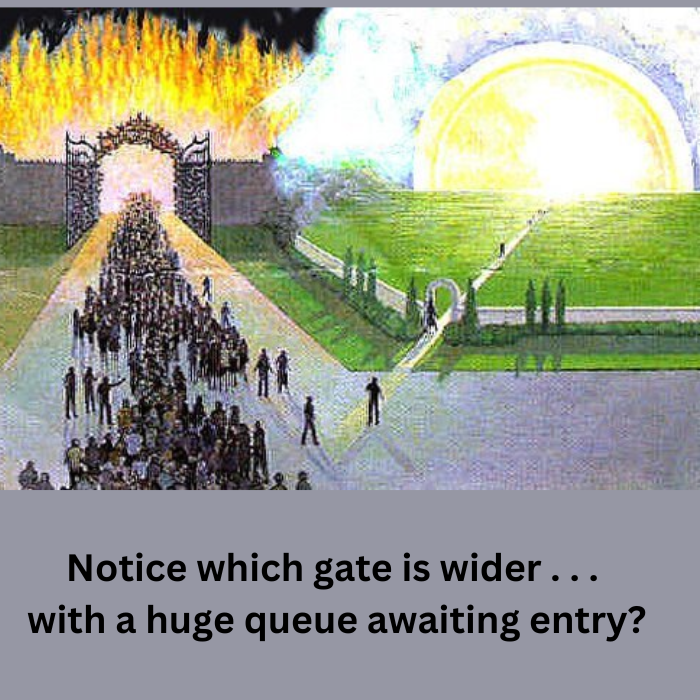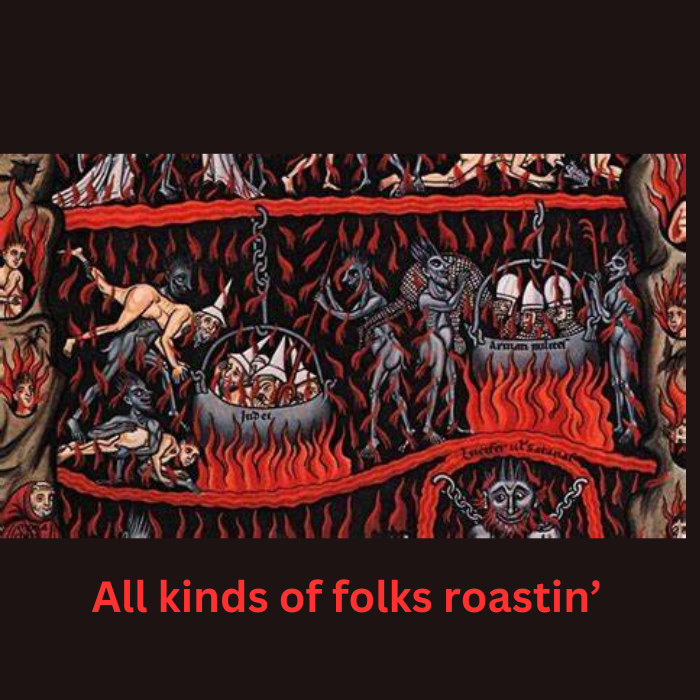You should fear this doctrine because healthy attrition, which ordinarily precedes contrition, offers a great opportunity to vacate sin and love God.
WARNING: This is a Church teaching you will not hear from your priest during his Mass homily or during any catechism class (child or adult). The modern Church, managed by gay dudes and an antipope, forbids priests from instructing us about sin, including this critical doctrine. As usual, the Church hijackers and hirelings have no shame in contradicting the overwhelming consensus of dozens of holy saints.
What is the Doctrine of the Few of the Saved?
What is attrition and contrition?
Is fear of hell a good idea?
We’ll explore these important concepts in this post.
The Doctrine of the Fewness of the Saved, a concept popularized by St. Leonard of Port Maurice, tells us that most baptized Catholics . . . go to hell! Yes, the fiery inferno, Gehenna, or the Lake of Fire (call it what you will) is the ordinary disposition for the vast majority of Catholics.
This is not a popular opinion of today’s happy-clappy, unconditional-mercy, praise-and-worship, “Vatican 2 is the best,” Catholic Church. Although today’s churchmen, including the popular prelate, Bishop Robert Barron, reject this doctrine, that doesn’t make it any less true. I’ll substantiate this claim with a long list of quotations and opinions from Catholic saints.

So Few Are Saved – A Short Selection of Saint Quotations
Our Lord to St. Bridget of Sweden
“Do not be surprised at what I say. If the wisest man in the world could count up how many souls fall into hell each day, they would outnumber the sands of the sea or the pebbles on the shore. This is a matter of justice, because these souls have separated themselves from their Lord and God. I am saying this so that the devil’s numbers may decrease, and the danger become known, and my army be filled up. If only they would listen and come to their senses!”
St. John Chyrsostom
“What do you think? How many of the inhabitants of this city may perhaps be saved? What I am about to tell you is very terrible, yet I will not conceal it from you. Out of this thickly populated city with its thousands of inhabitants not one hundred people will be saved. I even doubt whether there will be as many as that!”
St. Remigius
“Among adults there are few saved because of sins of the flesh. With the exception of those who die in childhood, most men will be damned.”
St. Leonard of Port Maurice
The following narrative from Saint Vincent Ferrer will show you what you may think about it. He relates that an archdeacon in Lyons gave up his charge and retreated into a desert place to do penance, and that he died the same day and hour as Saint Bernard. After his death, he appeared to his bishop and said to him, “Know, Monsignor, that at the very hour I passed away, thirty-three thousand people also died. Out of this number, Bernard and myself went up to heaven without delay, three went to purgatory, and all the others fell into Hell.”
St. Benedict Joseph Labre
“Meditate on the horrors of Hell which will last for eternity because of one easily-committed mortal sin. Try hard to be among the few who are chosen. Think of the eternal flames of Hell, and how few there are that are saved.”
St. Louis Marie de Montfort
“The number of the elect is so small — so small — that, were we to know how small it is, we would faint away with grief: one here and there, scattered up and down the world.”
Thankfully, there is hope, provided you follow this crucial advice . . .
St. Alphonsus Liguori
“If you persevere until death in true devotion to Mary, your salvation is certain.”

How Learning This Doctrine Can Help You Feel Sorry For Sin (Attrition & Contrition)
Attrition is the term that describes a baseline sorrow for your sins, rooted in the fear of going to hell and losing the joys of heaven. While you’ll commonly hear how this is insufficient for truly loving God, it’s not a bad thing at all, when you’re new to the spiritual life. Think of it as the “training wheels” for the spiritual journey when you’re still learning to purge yourself of sin and various attachments.
Many spiritual novices benefit tremendously from well-ordered attrition. In fact, the Church encourages it when She asks us to meditate on death, judgment, heaven, and hell. None of those items, not even heaven, speak directly to the glory of God and His infinite love. Yet these are the things we focus on directly before Christmas, during the season of Advent.
Attrition, fraught with a real servile fear of hell, is a terrific stepping stone towards contrition. That’s the stage of repentance where we would experience a more complete sorrow for our sins, not just over the pains of hell, but because they offend God.
Now, we’ll see why you should help young people and new catechumens meditate on the realities of hell. This is among the best ways to advance from meager attrition to a fuller contrition, and maximize one’s love for Jesus Christ.
So, Is It Healthy to Fear Hell and This Difficult Teaching?
It is healthy to experience rational fear, especially when it involves remorse for sin. There are certain kinds of fear, such as the fear of touching a hot stove, that are rational, and in fact, necessary for a well-ordered life.
Think about it, do we chastise people for being afraid of the direct consequences to actions like that? No, in the old days, we understood how consequences deterred evil or deviant behaviors. It’s the same reason parents would take children to prisons to have them “scared straight.”
Nowadays, we delude the youth into thinking it’s okay to behave wickedly, then act surprised when they leave the Catholic Church, fornicate constantly, and live like slobs. Oh, if only the parents of yesteryear would have kept the tradition of scaring their children straight.
Even better . . . what if parents would introduce the concept of hell (and not merely as an academic “concept”)? What if parents from the 1970s and 1980s would have taught their children about everlasting fire, the misery of Hell, and the consequences of lukewarm, cafeteria-style Catholicism?
Yet, here we are in 2023, and today’s parents and grandparents have the nerve to wonder why their progeny ignore the faith. They never taught the Doctrine of the Fewness of the Saved, blathered on about cheap grace and easy mercy, and allowed their children to participate in a horrific secular culture.
What in blazes did you expect? Well, it should have been the blazes since that’s where MANY MANY (almost all) Catholics will go. That’s not my armchair opinion, but rather the consensus of the saints, as I’ve demonstrated.
I have a few other testimonies and examples for you to consider to further drive home the significance of hell.
Examples and Testimonies on Hell

Gloria Polo’s Judgment
Gloria Polo was struck by lightning, died (before being allowed to resume life), and met Our Lord face-to-face for what would have been her personal judgment. While this is obviously a private revelation, it’s yet another telling example of what’s at stake. You can search the rest of the website for other materials on death, judgment, heaven, and hell.
Fr. Ripperger Explains Hell
Fr. Chad Ripperger is a well-known exorcist who studies these things academically and wrestles against the very denizens of hell through his ministry. The above video includes his informed take on the physical, mental, and spiritual realities of eternal damnation.
Fatima Visions of Hell
Even Our Loving Mother, the Blessed Virgin, recognizes the value of meditating on hell, all the way to the point of escorting three small children to see it in person. You’re free to think of me what you will: a crank, narcissist, schismatic, mean to the “pope,” or what have you. What choice words do you have for Our Blessed Mother who wants you to be aware of Hell and the many souls that fall into there “like snowflakes”?
St. John Bosco’s Visions
St. John Bosco had many visions, but here we have examples of what happens when you conceal something grave during confession.
A Letter from Hell
This one’s less known, but involves a girl whose old friend died in a car wreck, went to hell, and wrote to her about it. As with every other example, you are not required to believe it, but the heavy volume of horrific testimony should arouse a healthy fear of eternal damnation.
Concluding Thoughts
Do these examples horrify you?
Excellent! That’s the entire point. Just as you should fear burning your hand on that stove, you should also fear burning every atom of your body and soul in fiery Gehenna for all eternity.
Finally, I’ll conclude with a criticism I’ve received over this topic, which usually goes something like “why don’t you just meditate on God and heaven instead?”
This could almost be a reasonable objection, if not for a few obvious problems.
- It implies that meditation on heaven and hell must be mutually exclusive, whereas the Church advises us to ponder all four last things.
- The spiritual doctors, particularly St. Teresa of Avila, recommend doing these things in a certain order. When she describes her purgative, illuminative, and unitive stages, the first involves significant reflection on the miserable state of one’s soul. What, we should wonder, would be more miserable than the permanence of everlasting hell? Notice how “purgative” even resembles “purgatory,” which, St. Thomas reminds us, is a quadrant of hell. In other words, you begin with purgation/attrition, grow in the spiritual life, then eventually climb closer to the apex of the unitive stage. Once you arrive, you would enjoy more locutions and heavenly experiences. St. Teresa expounds on this more with her “seven mansions” where the first couple of mansions involve purging mortal sin and deliberate venial sin. Heavenly thoughts, although not entirely absent in the beginning, are much more distinct later along the spiritual journey.
- NOTE: St. Teresa also had a horrifying vision of hell, where she saw her designated spot. She used that experience for meditative purposes for the rest of her life.
- Our Lord reveals to us that the eye has not seen, nor the ear heard what awaits us in the heavenly kingdom. While there are limited private revelations regarding heaven, there are many more on the horrors of hell. Perhaps that is by design.
So, as we continue to enjoy this glorious octave of Easter, let’s not lose sight of the battle against that roaring lion and the gates of hell. The Church will never succumb to it, even while partially eclipsed by an anti-church. You and I, however, might fall if we don’t cleave to the traditional Church, pray the Rosary (15 decades) daily, go to confession often, and . . . meditate on hell.


2 Comments